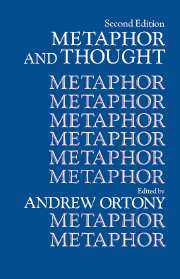Book contents
- Frontmatter
- Contents
- List of contributors
- Preface to the second edition
- Preface to the first edition
- 1 Metaphor, language, and thought
- METAPHOR AND MEANING
- METAPHOR AND REPRESENTATION
- METAPHOR AND UNDERSTANDING
- METAPHOR AND SCIENCE
- METAPHOR AND EDUCATION
- 24 The instructive metaphor: Metaphoric aids to students' understanding of science
- 25 Metaphor and learning
- 26 Learning without metaphor
- 27 Educational uses of metaphor
- References
- Author index
- Subject index
24 - The instructive metaphor: Metaphoric aids to students' understanding of science
Published online by Cambridge University Press: 05 June 2012
- Frontmatter
- Contents
- List of contributors
- Preface to the second edition
- Preface to the first edition
- 1 Metaphor, language, and thought
- METAPHOR AND MEANING
- METAPHOR AND REPRESENTATION
- METAPHOR AND UNDERSTANDING
- METAPHOR AND SCIENCE
- METAPHOR AND EDUCATION
- 24 The instructive metaphor: Metaphoric aids to students' understanding of science
- 25 Metaphor and learning
- 26 Learning without metaphor
- 27 Educational uses of metaphor
- References
- Author index
- Subject index
Summary
The goal of science is to describe and explain how things in the universe work. It follows that a goal of science education is to help students understand these descriptions and explanations. In this chapter, I explore the language of science and of science education – including the respective roles of precise quantitative description and metaphoric qualitative explanation – and I focus on the instructive metaphor hypothesis, the idea that metaphoric language can play a productive role in fostering students' understanding of scientific descriptions and explanations. The chapter deals with three subjects: the language of science, the language of science education, and metaphoric aids to science learning.
The language of science
This section considers the role of descriptive and explanative language, and of literal and constructive language in science.
Descriptive and explanative language
Historians of science (Bronowski, 1978; Cohen, 1960; Kearney, 1971; Westfall, 1977) have viewed description and explanation as two successive stages in the historical development of scientific knowledge. For example, Westfall (1977, p. 1) distinguished between the Pythagorean tradition based on the idea that “the cosmos was constructed according to the principles of mathematical order” so that the goal of science is to provide “an exact mathematical description,” and mechanistic philosophy based on the idea that “natural phenomena are caused by invisible mechanisms entirely similar to the mechanisms in everyday life” so that the goal of science is the elucidation of cause-and-effect systems.
- Type
- Chapter
- Information
- Metaphor and Thought , pp. 561 - 578Publisher: Cambridge University PressPrint publication year: 1993
- 20
- Cited by

